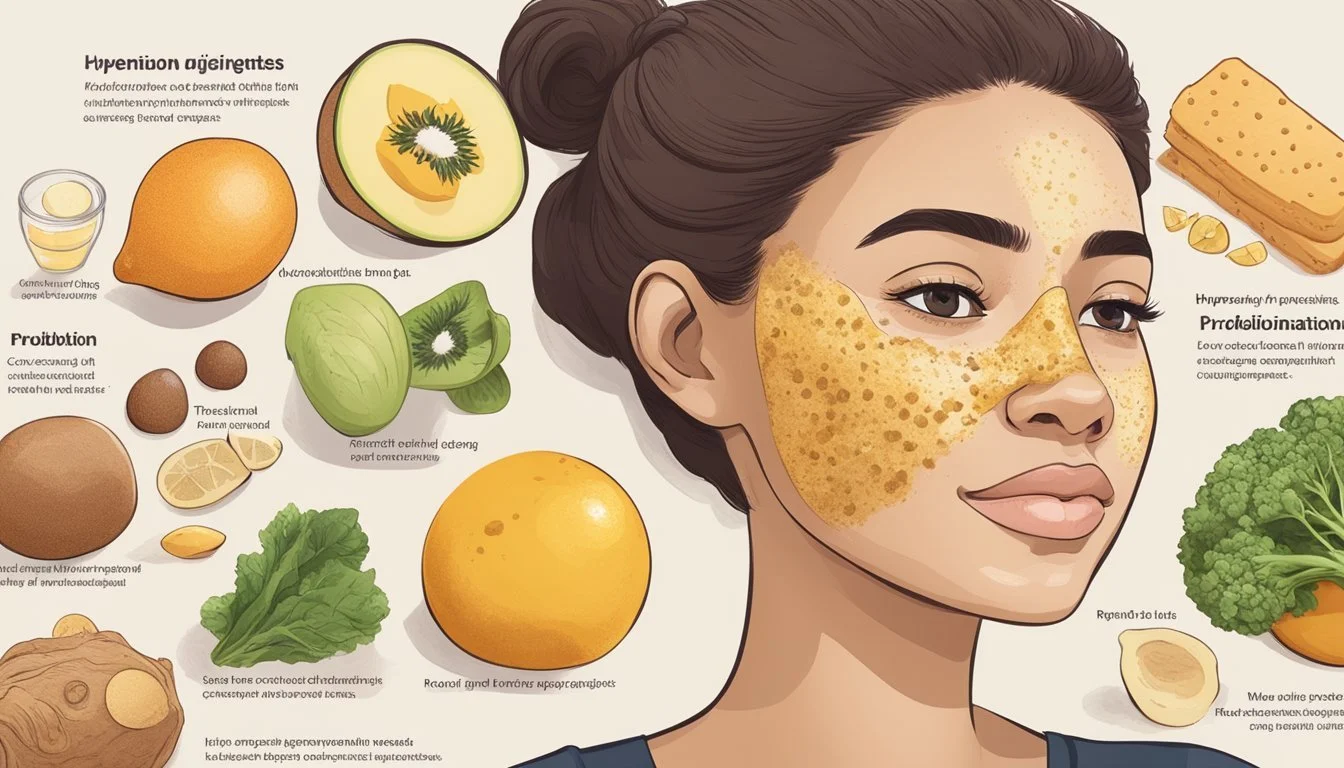Carnivore Diet & Hyperpigmentation
Understanding Skin Changes
This Article is Part Of Our Guide on the Carnivore Diet
Hyperpigmentation, a common skin condition characterized by the darkening of an area of skin, can occur for various reasons, including sun exposure, hormonal changes, or inflammation. Traditionally, treatments have focused on topical applications or lifestyle adjustments to manage and mitigate the condition. However, recent discussions in dietary circles suggest that the food one consumes may also play a role in the health of their skin. Among these dietary approaches, the carnivore diet—a regimen consisting solely of animal products—has been claimed by some to influence skin conditions, including the appearance of hyperpigmentation.
While the carnivore diet is a subject of controversy among nutritionists, its proponents argue that it can bring benefits for skin health. They attribute these potential benefits to the elimination of plant-based foods, which they claim may cause inflammation and other issues that could exacerbate skin concerns like hyperpigmentation. The diet highlights the consumption of meats, particularly organ meats, which are rich in essential nutrients such as vitamins A, D, E, and K, as well as zinc and selenium—minerals that are often associated with skin health and integrity.
Skeptics remain, and the scientific community continues to evaluate the impact of the carnivore diet on health, with hyperpigmentation being an area of interest. Some adherents suggest that the reduction of dietary triggers for inflammation, a common underlying factor for many skin conditions, may result in improvements in hyperpigmentation. Despite anecdotal reports, conclusive evidence from robust scientific studies is essential to validate these claims and guide individuals toward effective dietary strategies for managing hyperpigmentation and promoting overall skin health.
Overview of the Carnivore Diet
The Carnivore Diet is characterized by its exclusive focus on animal products. It is a restrictive regimen that prioritizes meat as the primary food source. This includes a wide range of meats such as beef, pork, lamb, bison (What wine goes well with bison?), and poultry. The diet extends to fish, eggs, and certain types of dairy products, making it rich in protein and other nutrients found in animal sources.
Organ meats are particularly esteemed within the Carnivore Diet for their nutrient density. They are encouraged due to their high levels of vitamins and minerals. Proponents argue that consuming a variety of animal tissues, including organ meats, can lead to a more balanced nutrient intake.
Beef: Iron, Zinc, B-Vitamins
Pork: Thiamine, Selenium
Lamb: Vitamin B12, Niacin
Poultry: Protein, Vitamin B6
Adherence to the diet means abstaining from plant-based foods, which results in an almost zero-carbohydrate intake. While traditional diets include fruits, vegetables, and grains, the Carnivore Diet eliminates these, positing that animal products alone can fulfill nutritional needs.
Critics of the diet suggest the potential for nutrient imbalances and the absence of beneficial plant compounds such as fiber. However, those who follow it claim benefits such as weight loss and reduced inflammation. It is essential to approach the Carnivore Diet with caution and consider consulting a healthcare provider to ensure it aligns with individual health needs and goals.
Role of Nutrition in Skin Health
The interplay between diet and skin health is pivotal, with certain nutrients acting as building blocks for maintaining and repairing the skin, while others serve as protectants against skin damage.
Impact of Nutrients on Skin
Nutrients play a critical role in skin health. Essential fats like omega-3 fatty acids help maintain the skin's lipid barrier, effective in managing inflammatory skin conditions. The skin also requires adequate protein, crucial for collagen synthesis—a major component of the skin's structural integrity.
Vitamins and Skin Health
Vitamin Function Skin Benefit A Cell growth Promotes healthy skin cell production and repairs skin tissue. C Antioxidant Reduces the impact of oxidative stress and supports collagen synthesis. D Immune function Assists in skin cell metabolism and repair. E Protect cell membranes Contributes to UV defense mechanisms and reduces photo-damage. K Blood clotting Aids in the healing of bruises and dark spots.
These vitamins are integral as they aid in protection against UV damage, support the structure, and improve the skin's appearance.
Minerals and Skin Health
Zinc and iron are minerals essential for skin health.
Zinc: Important for wound healing and fighting bacteria; a deficiency can result in skin rashes and delayed wound healing.
Iron: Critical for red blood cells to carry oxygen to skin tissues, supporting overall skin health.
A well-balanced diet rich in these minerals can help maintain the integrity and appearance of the skin.
Carnivore Diet and Skin Conditions
The Carnivore Diet is posited to influence skin health by targeting inflammation, which plays a role in various skin conditions. This section will look into its impact on hyperpigmentation, acne, eczema, dermatitis, and psoriasis—common skin issues that can stem from autoimmune triggers, allergens, and hormonal imbalances.
Hyperpigmentation
Hyperpigmentation, the darkening of skin areas, can be exacerbated by sunlight and certain internal factors. While the Carnivore Diet isn't a recognized cure for hyperpigmentation, its emphasis on reducing inflammatory foods may prevent further aggravation of this condition. Genetics and hormonal changes also contribute to hyperpigmentation, indicating a multifactorial approach to management is necessary.
Acne and Carnivore Diet
The incidence of acne may be influenced by diet-induced changes in hormones and systemic inflammation. Anecdotal evidence suggests that some individuals experience a reduction in cystic acne and other forms of this condition upon adopting a Carnivore Diet. This diet eliminates common irritants found in plant-based foods, possibly leading to a decrease in acne-related inflammation.
Eczema and Dermatitis
Eczema and dermatitis are often the result of complex interactions between genetics, environmental triggers, and the immune system. The Carnivore Diet, through the exclusion of potential allergens found in plant foods, may offer relief for some people with these conditions by limiting the variety of triggers and thereby mitigating inflammatory responses.
Psoriasis and Autoimmune Skin Conditions
Psoriasis and certain autoimmune skin conditions are linked to chronic inflammation. A diet that restricts foods known to trigger these conditions could be of benefit. By focusing on a high-protein and fat intake, and excluding potentially inflammatory plant-based foods, the Carnivore Diet may help alleviate symptoms associated with psoriasis and similar autoimmune-related skin issues. However, it is important to approach such dietary changes with caution and under medical supervision, as the evidence is not conclusive.
Digestive Health and the Carnivore Diet
The carnivore diet, with its exclusive focus on animal products like meat, fish, eggs, and some dairy, excludes carbohydrates and fiber. This can have significant impacts on digestive health, particularly affecting the gut microbiome and conditions related to the digestive system.
Gut Microbiome
The gut microbiome consists of a complex community of bacteria and other microorganisms that reside in the digestive tract. These microbes play a crucial role in digestion, the immune system, and overall health. The carnivore diet alters the gut microbiome due to the absence of dietary fiber and plant-based foods, which are the primary source of nourishment for many of these beneficial bacteria. Studies suggest that a reduced microbiome diversity could occur, as the diet does not provide the variety of substrates needed to support a wide range of microbial species. With a focus on meat, the body may require fewer fiber-digesting bacteria, potentially impacting the balance of the microbiome.
Effects on Digestive Conditions
Individuals with certain digestive conditions such as Small Intestinal Bacterial Overgrowth (SIBO) may experience changes when following a carnivore diet. Since the diet eliminates most sources of carbohydrates, it can reduce the fermentation that feeds the excess bacteria of SIBO.
Probiotics: The lack of fermented foods, which contain natural probiotics, may influence the levels of beneficial bacteria in the gut.
Digestive health: The absence of fiber, often deemed essential for gut health, could lead to changes in bowel habits and the function of the digestive system.
This dietary approach necessitates careful consideration and medical guidance to ensure that it does not adversely affect one's gut health and overall well-being.
Potential Benefits and Risks
This section examines the carnivore diet's impact on mental clarity, metabolic health, and possible adverse effects. The benefits and risks of this controversial diet are scrutinized with a close look at its influence on focus, energy, weight management, and health consequences.
Benefits on Focus and Energy
Individuals on a carnivore diet often report enhanced focus and energy, which might be attributed to the diet's ketogenic aspect. When consuming a diet high in fat and very low in carbohydrates, the body enters a state of ketosis, which can lead to improved mental clarity and sustained energy. The absence of sugar and carbohydrates also helps stabilize blood sugar levels, possibly leading to fewer fluctuations in energy and focus throughout the day.
Weight Loss and Metabolic Health
The carnivore diet, being high in protein and fats, can contribute to weight loss through increased satiety and a reduction in overall caloric intake. Many participants observe a noticeable reduction in body fat percentage. Furthermore, this way of eating may positively influence metabolic health markers, such as improved insulin sensitivity, which can be advantageous for individuals with diabetes or those looking to manage their weight. However, long-term impacts remain a topic for further research.
Potential Risks and Side Effects
Despite its potential benefits, the carnivore diet carries several risks and side effects. A diet consisting exclusively of animal products can lead to deficiencies in vitamins and minerals typically found in plant foods, such as vitamin C and fiber. Side effects may include an increase in cholesterol levels and a heightened risk of specific health issues due to the high intake of saturated fats. Critics also point out the lack of long-term studies on the carnivore diet, implying that the health implications of maintaining such a diet over time are still largely unknown.
Carnivore Diet Versus Other Diets
The Carnivore Diet is a restrictive regimen focused on consuming exclusively animal products and is often contrasted with plant-based and ketogenic diets. Each diet proposes different health benefits and restrictions, and their impacts on conditions like hyperpigmentation may vary.
Comparison with Plant-Based Diets
The Carnivore Diet significantly departs from plant-based diets, which are rich in vegetables, fruits, grains, nuts, seeds, and legumes. Plant-based diets are known for their high fiber content and broad nutritional diversity, offering a variety of vitamins, minerals, and antioxidants. These nutrients contribute to overall skin health and may help with issues such as hyperpigmentation.
Conversely, proponents of the Carnivore Diet suggest that focusing on animal products may reduce the intake of potential inflammatory plant compounds. However, it may also limit the intake of certain phytonutrients that can support skin health and pigmentation management.
Vitamins (e.g., A, C, E):
Plant-Based Sources: Fruits, vegetables, nuts, seeds
Carnivore Diet Sources: Liver, fatty fish
Minerals (e.g., Zinc):
Plant-Based Sources: Legumes, nuts, seeds
Carnivore Diet Sources: Meat, especially organ meats
Fiber:
Plant-Based Sources: Whole grains, vegetables, fruits, legumes
Not typically found in animal products
Carnivore Diet and Ketogenic Diet
Both the Carnivore Diet and the Ketogenic Diet promote a low-carb approach, yet they differ in their inclusion of plant-based foods. The keto diet allows for limited consumption of vegetables, nuts, and seeds, which are excluded from the Carnivore Diet.
The ketogenic diet is characterized by high fat, moderate protein, and low carbohydrate intake to induce ketosis, a state in which the body burns fat rather than carbohydrates for energy. Animal products in a keto diet may include:
Fatty fish
Cheese
Butter
While these keto-friendly foods are also central to the Carnivore Diet, the latter emphasizes protein over fat and does not aim for the specific macronutrient ratios necessary to maintain ketosis. Nutrient deficiencies can occur without careful planning in both diets but are more likely in the restrictive Carnivore Diet, making it critical for individuals to monitor their health and nutritional intake.
Dietary Considerations and Additions
When managing hyperpigmentation through diet, especially within the confines of a carnivore diet, specific attention must be given to the types of animal products consumed. The goal is to provide the body with nutrients that may support skin health and potentially mitigate hyperpigmentation.
Incorporating Seafood and Fatty Fish
Seafood, particularly fatty fish like salmon, is rich in omega-3 fatty acids, which may help reduce inflammation—a contributing factor in skin conditions. One should aim for a regular intake of seafood to harness these benefits.
Salmon: A source of omega-3, vitamin D, and other skin-supporting nutrients.
Other Fatty Fish: Such as mackerel or herring can also provide similar benefits as salmon.
Use of Dairy and Eggs
Though the traditional carnivore diet often excludes dairy, its selective inclusion, along with eggs, can offer additional nutrients. Eggs are a valuable source of vitamins and minerals, while dairy products may provide calcium and vitamin D.
Eggs: Contain vitamins A, D, and E, which are essential for skin health maintenance.
Dairy: If included, should be full-fat to align with carnivore principles and provide fat-soluble vitamins.
Selecting Meats and Organ Meats
Different meats provide varied nutrient profiles; thus, selection is key.
Beef, Pork, Bison, Lamb: These red meats are high in zinc and iron, two minerals important for skin health.
Poultry: Offers a lighter protein option and can be included for variety.
Organ Meats: Particularly liver is dense in vitamins A and B12. It is important to consume organ meats like liver moderately due to their high nutrient concentration.
By carefully selecting the right types of meats, seafood, and possibly some dairy and eggs, one following a carnivore diet may influence their skin health positively and address issues like hyperpigmentation with the nutrients these foods provide.
Lifestyle Factors Influencing Diet Outcomes
When considering the carnivore diet's effects on hyperpigmentation, it's essential to understand the interplay with lifestyle factors that can influence outcomes. These factors contribute to the body's overall health and play a role in skin appearance and recovery.
Sun Exposure and Vitamin D
Sun exposure is a significant source of vitamin D, essential for skin health. However, too much exposure to UV rays can exacerbate hyperpigmentation. Individuals on the carnivore diet should monitor their sun exposure to balance obtaining adequate vitamin D while minimizing the risk of skin damage.
Recommended Sun Exposure: Limited direct exposure; use sun protection if staying outdoors longer.
Vitamin D Sources: Besides sunlight, consider supplements or vitamin D-rich animal products.
Stress Management and Hormonal Balance
Stress can disrupt hormonal balance, impacting skin health and potentially leading to issues like hyperpigmentation. A carnivore diet excluding plant-based foods may require additional stress management techniques.
Techniques for Stress Management:
Regular physical activity
Mindfulness practices (e.g., meditation, breathing exercises)
Sleep and Recovery
Adequate sleep is crucial for recovery and maintaining hormonal balance, which can affect skin health. Poor sleep may intensify skin problems, including hyperpigmentation.
Sleep Recommendations: 7-9 hours per night
Impact on Skin Health: Sleep allows for cellular repair and may help mitigate hyperpigmentation.
Avoidance of Certain Foods and Ingredients
Managing hyperpigmentation involves dietary adjustments, particularly the reduction or elimination of certain foods and ingredients. These changes aim to address the underlying causes such as inflammation and cellular stress.
Reducing Intake of Sugars and Carbohydrates
A high intake of sugars and carbohydrates is believed to exacerbate inflammatory conditions, impacting skin health. Sugar, especially in refined forms, can hinder the body's ability to combat inflammation, indirectly aggravating hyperpigmentation. Similarly, excessive consumption of high glycemic carbohydrates like white bread and pastries can trigger similar issues. Individuals are encouraged to minimize these items in their diet:
Sugars: Avoid added sugars found in sodas, sweets, and desserts.
Carbohydrates: Limit intake of simple carbohydrates present in foods like pasta and white rice.
Choosing complex carbohydrates and natural sugars found in whole foods can be one way to modify intake without complete elimination.
Eliminating Processed Foods
Processed foods often contain a variety of additives and high levels of sodium which can lead to inflammation. They are also frequently high in alcohol, sugar, and unhealthy fats that may worsen hyperpigmentation. The recommended approach is to remove such items from one's diet:
Alcoholic Beverages: Alcohol can increase oxidative stress and dehydration, impacting skin health.
Processed Meats: Items like sausages and bacon typically contain preservatives and should be avoided.
By selecting whole, unprocessed options, individuals can potentially improve their skin condition and overall well-being. This includes opting for fresh produce over canned fruits, drinking water or herbal tea instead of sugary beverages, and choosing fresh cuts of meat over processed varieties.
Supplementation and Nutrient Density
Optimal nutrient intake is vital on a carnivore diet to prevent issues such as hyperpigmentation, which can signal nutrient deficiency. Ensuring a high intake of essential fatty acids, proteins, vitamins, and minerals is crucial for maintaining skin health and overall well-being.
Essential Fatty Acids and Proteins
The carnivore diet is naturally rich in protein, which supports collagen production, necessary for healthy skin. However, fatty acids like omega-3 are equally important. They are found predominantly in fatty fish, which should be included in the diet to maintain skin health. Intake of these nutrients helps prevent hyperpigmentation. A balanced carnivore diet provides:
Protein: Essential for repair and regeneration of skin cells.
Omega-3 Fatty Acids: Help to fight inflammation and may reduce the risk of hyperpigmentation.
Vitamins and Minerals
Vitamins and minerals play pivotal roles in skin health:
Vitamin A:
Important for skin repair and may help in reducing hyperpigmentation.
Liver and other organ meats
Vitamin C:
Not typically found in meat, however, it is important for collagen formation and skin health. Can be sourced from liver if needed.
Liver
Zinc:
Aids in skin healing and may help in managing hyperpigmentation.
Meat, shellfish, and dairy
Selenium:
Antioxidant properties support skin health.
Organ meats and seafood
Iron:
Supports healthy skin coloration.
Red meats and organ meats
Folate:
Necessary for healthy cell division.
Liver
Consuming a nutrient-dense carnivore diet, with a focus on organ meats like liver and bone marrow, can provide most of these nutrients. Bone broth is rich in minerals and may boost antioxidant intake to support skin health. Regular intake of these nutrients is critical to manage and prevent conditions like hyperpigmentation.
Carnivore Diet Customization
When tailoring the carnivore diet, individuals need to consider their unique bodily requirements and lifestyle demands. Proper customization ensures the diet supports personal health and fitness goals effectively.
Personalizing Macronutrient Ratios
The carnivore diet typically emphasizes a high intake of proteins and fats, with minimal to no carbohydrates. Individuals may need to adjust their macronutrient ratios depending on their specific health goals and bodily responses. Consulting with a healthcare professional can provide guidance on how to structure these ratios to maintain health while following a carnivore diet.
For weight management or muscle growth, one might want to adjust the intake of fat versus protein. For instance:
Weight management: A higher fat-to-protein ratio could be more satiating, helping with appetite control.
Muscle gain: A greater emphasis on protein may support muscle repair and growth, especially when paired with resistance training.
Adjusting for Activity Levels
Activity levels can significantly influence the dietary needs of an individual on the carnivore diet. Those with higher activity levels may require more calories overall and should consider this when planning their meals.
An optimal approach for those engaged in high-intensity activities might include:
Increased protein to support muscle recovery.
More frequent meals or larger portions to meet caloric requirements.
Conversely, individuals with a sedentary lifestyle may need to be mindful of their overall caloric intake to avoid excessive energy consumption that the body doesn't require. This can be achieved by slightly reducing portion sizes or the frequency of high-fat meat consumption.
It's essential for each person to monitor their body's response to activity changes and adjust their carnivore diet accordingly, all the while seeking professional advice to ensure nutritional adequacy and overall well-being.
Conclusion
The carnivore diet, which consists primarily of animal products and excludes plant foods, has been reported to influence skin conditions such as hyperpigmentation. Anecdotal evidence suggests that the diet may prevent aggravation of existing skin conditions due to changes in Omega-6 fatty acid levels, which are theorized to affect light sensitivity.
It is crucial to note that while individual experiences on the carnivore diet related to skin health, such as those mentioning an absence of scleroderma flares or attempts at treating hyperpigmentation, are compelling, these accounts should not override the need for clinical research. The diet's impact on skin conditions has not been extensively studied, and the current knowledge primarily stems from personal testimonies and hypothesis.
Health professionals raise concerns regarding nutrient deficiencies and potential increases in cardiovascular disease risk associated with the diet. As with any dietary change, individuals considering the carnivore diet for skin-related issues or any other health concerns should consult with a healthcare provider to ensure nutritional adequacy and monitor health markers.
In summary, the relationship between the carnivore diet and hyperpigmentation requires further investigation to provide substantive evidence. Individuals may have unique responses based on their physiology, which underscores the importance of medical advice before adopting such a restrictive dietary regimen.













